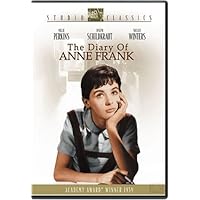
Average Reviews:

(More customer reviews)Holocaust survivor Elie Wiesel once wrote that dramatizing the Holocaust was a futile task, not because dramatization could not be done, but because any such attempt would trivialize the evil inherent in the Nazi persecution of the Jews. Wiesel had good reason for his belief, having directly experienced what circumstances were like at the Auschwitz death camp.
In one sense I agree with Wiesel; however, I also agree with those, such as director George Stevens, who believed that dramatization served the critical purpose of informing the public of what occurred during the Nazi era. Further, as Otto Frank maintained, it was important that audiences realized that what his family and other Jewish people endured was not something restricted to Jews, but was, rather, an object lesson for the persecution of all people forced to endure the tyranny of genocidal regimes.
In a sense, therefore, it's inevitable that Stevens' filming of 'The Diary of Anne Frank' both failed and succeeded. It failed in that it commercialized the Holocaust, as every dramatic production is forced to do. But it succeeded in its educational mission, especially considering that at the time of its release in 1959, few people were aware of Anne Frank's diary, or of the Holocaust generally.
Seeing the film today, it is still a powerful experience. Admittedly, as an aspect of its commercial treatment, certain elements were introduced that either were not in the original diary ---- such as the stealing of bread by Albert Dussell (pseudonym of Friedrich Pfeffer) ---- or were exaggerated for dramatic reasons (the love interest between Anne and Peter Van Dann). But the overall power of the basic situation ---- the intense atmosphere of tension and claustrophobia ---- and the story of Anne Frank's adolescent transformation and her growing awareness of the transformation of Dutch society through Nazi oppression ---- gives us a window on the Holocaust which is unique. The film, like the diary, holds up a mirror of conscience in what must have seemed at the time to be a world of sprawling insanity. Anne Frank triumphs, as the Nazis emphatically did not, in transcending the contradictions within herself, and as a consequence her idealism shines through at the end (even if this, too, was exaggerated for cinematic reasons).
Millie Perkins, who plays Anne in the film, has sometimes been slighted for her ostensibly awkward performance, but I believe this is a cynical and unjust criticism. For one thing, Perkins was not a trained actress, but rather a model who happened to have the right look and personality for the part. But as both the documentary and one of the other supplements on this DVD point out, this was precisely why George Stevens chose her for the role. He wanted an unknown actress, not a professional who would 'impose' her persona on the character. He believed ---- and I think correctly ----- that her look of innocence, and aura of adolescent idealism, were perfect for what he desired, and it's ultimately these qualities which impress us by their contrast with the horrific circumstances that surrounded her.
The other cast members are also superb. Though Shelley Winters won an Oscar as Best Supporting Actress, virtually all the actors, especially Joseph Schildkraut and Ed Wynn, are equally brilliant. In fact, Schildkraut not only physically resembled Otto Frank, but, according to Anne Frank's cousin (interviewed as part of the accompanying documentary, 'Echoes of the Past'), was also similar to him in terms of personality and demeanor. Wynn, for his part, turns in an amazingly convincing performance in a serious role, playing completely against type.
Whatever the liberties taken by the screenplay writers for 'Diary,' the film remains faithful to the core experiences related in Anne Frank's journal ---- both to her inner emotions and conflicts with her family, and to her widening awareness of her family's place in the overall scheme of Nazi terror. The fact that this DVD transfers the film in such superior video and audio quality, and adds several excellent supplements (including a first-rate 90-minute documentary), makes this disc a fine addition to anyone's video collection.
Click Here to see more reviews about: The Diary of Anne Frank (1959)
A diary discovered in the attic of an Amsterdam factory reveals the plight of a jewish refugee family that lived there in hiding for two years during the Nazi occupation.
Click here for more information about The Diary of Anne Frank (1959)

0 comments:
Post a Comment